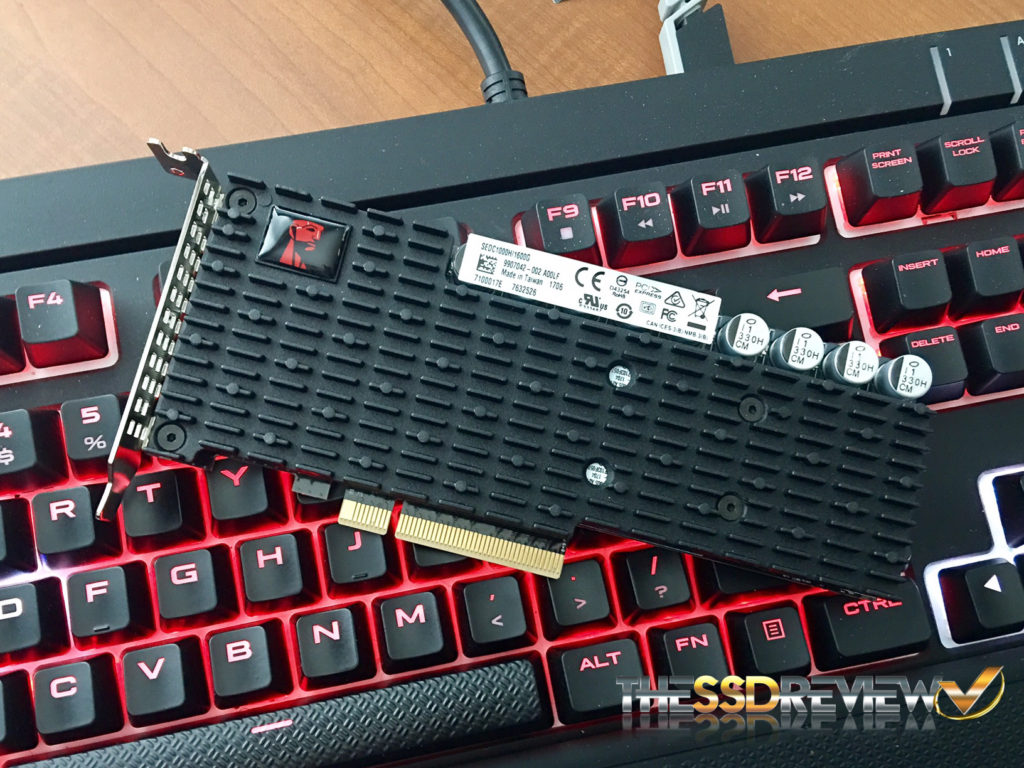TSSDR TEST BENCH AND PROTOCOL
SSD testing at TSSDR differs slightly, depending on whether we are looking at consumer or enterprise SSDs. For our enthusiast testing today, our goal is to test in a system that has been optimized with our SSD Optimization Guide. To see the best performance possible, the CPU C states have been disabled, C1E support has been disabled, Enhanced Intel SpeedStep Technology (EIST) has been disabled. Benchmarks for consumer testing are also benchmarks with a fresh drive so, not only can we verify that manufacturer specifications are in line but also, so the consumer can replicate our tests to confirm that they have an SSD that is top-notch. We even provide links to most of the benchmarks used in the report.
Testing of the Kingston DCP1000 was a bit different of a test animal. Normally, the RAID configuration might be achieved on the device which is not the case with the DCP1000, where it was fully user configurable after installation, preventing any sort of RAID volume from the UEFI…or even enabling it to boot from a set RAID volume. The RAID volume needs to be set after bootup, eliminating testing with PCMark 8 and other programs where we prefer an unformatted volume.
Interesting enough, however, one could easily set one of the Kingston 400GB SSDs as a boot volume as it is UEFI compatible, and then RAID the other 3 volumes for their needs.
 As expensive as this SSD may be, this particular configuration would be a media professionals dream.
As expensive as this SSD may be, this particular configuration would be a media professionals dream.
SYSTEM COMPONENTS
The components of this Test Bench are detailed below. All hardware is linked for purchase and product sales may be reached by a simple click on the individual item. As well, the title is linked back to the individual build article where performance testing can be validated.
TSSDR ASUS Z270 APEX TEST BENCH (link)
| PC CHASSIS: | Corsair Crystal Series 460X RGB |
| MOTHERBOARD: | ASUS Z270 ROG Maximus IX Apex |
| CPU: | Intel Kaby Lake I7-7700K |
| CPU COOLER: | Corsair Hydro Series H110i GTX |
| POWER SUPPLY: | Corsair RM850x 80Plus |
| GRAPHICS: | PNY GTX 1080 XLR8 Gaming OC |
| MEMORY: | Corsair Dominator Pl 32GB 2800 |
| STORAGE: | Samsung 2TB 960 Pro M.2 SSD |
| KEYBOARD: | Corsair Strafe RGB Silent Gaming |
| MOUSE: | Corsair M65 Pro Gaming |
| OS | Microsoft Windows 10 Pro 64 Bit |
BENCHMARK SOFTWARE
The software in use for today’s analysis is typical of many of our reviews and consists of Crystal Disk Info, ATTO Disk Benchmark, Crystal Disk Mark, AS SSD, Anvil’s Storage Utilities, and PCMark Vantage. We might typically use PCMark 8, as well, but cannot as the RAID volume cannot be achieved at source leaving an unformatted volume for the test. We prefer to test with easily accessible software that the consumer can obtain, and in many cases, we even provide links. Our selection of software allows each to build on the last and to provide validation to results already obtained.
 The SSD Review The Worlds Dedicated SSD Education and Review Resource |
The SSD Review The Worlds Dedicated SSD Education and Review Resource | 

As expected, the Kingston DCP1000 is an absurdly powerful PCI-e SSD, especially when it comes to Real World File Transfers. It’s only caveat for me, being that all 4 M.2 SSD’s cannot be configured as a boot volume.
Yes… but imagine going the 1/3 route where the first SSD is still pushing over 2GB/s while the remaining three have to be reaching above 5GB/s. I should have tested this specifically but never had the idea until it was shipped off for our enterprise testing.
Les, maybe if you had an Intel DC P3700 on hand, you could’ve done some File Copy tests with the Kingston DCP1000
Yes that would have been possible but comparing any similar enterprise storage resource in a simple file transfer test isn’t really a fair proposition. It is like putting it beside the P4800x and forming opinion on file transfer where the DCP1000 would destroy the P4800…. until of course they are put side by side in true server settings and that P4800 has no settling whatsoever for steadystate.
You’re linking to an old AS SSD https://www.guru3d.com/files-details/as-ssd-benchmark.html is the new one idk about the other softwares you’re linking to!
I’d be curious how the PCIe host card performed with several other M.2 drives installed. This would be a quick and dirty way to get four Samsung 960 Pro’s into a system.
Also curious how it would have handled a single 4x PCIe 3.0 based M.2 drive when put into an older system with an 8x PCIe 2.0 slot. That’d be one way to provide more bandwidth to an older system.